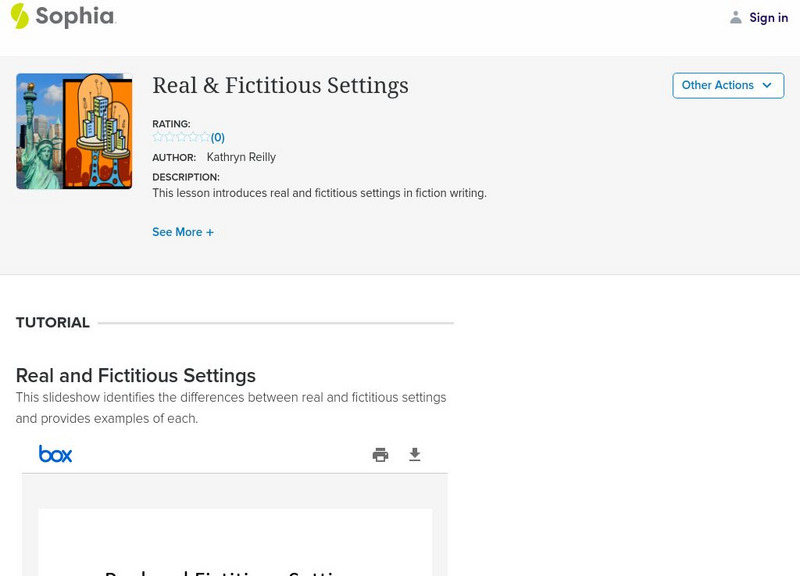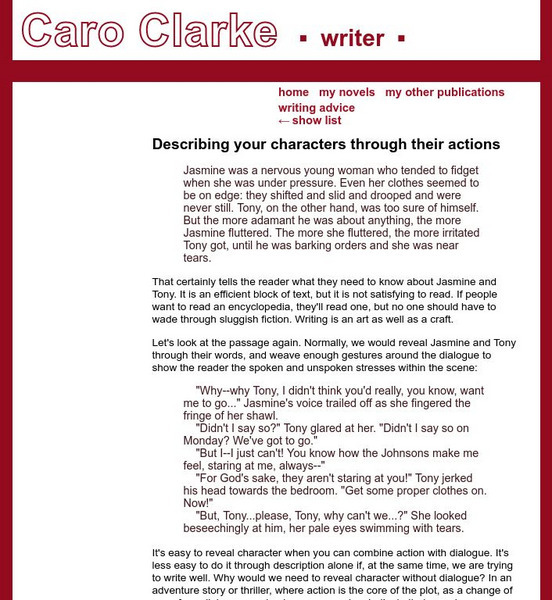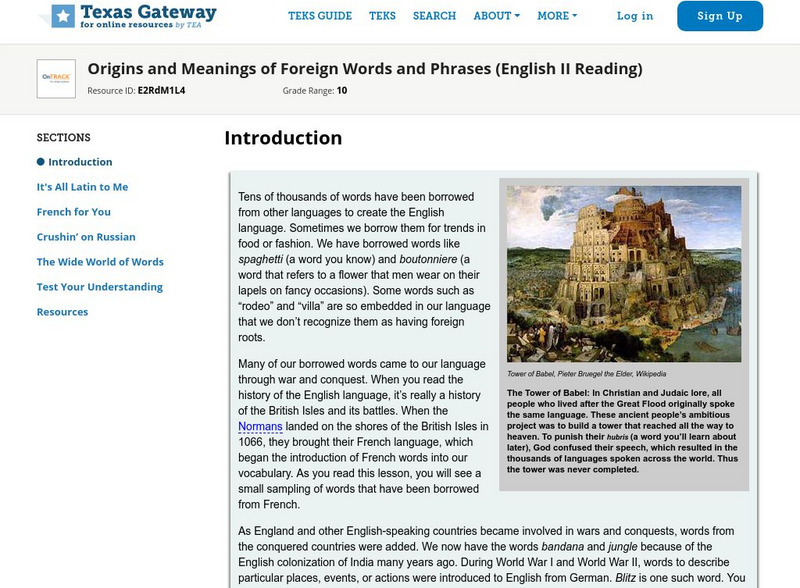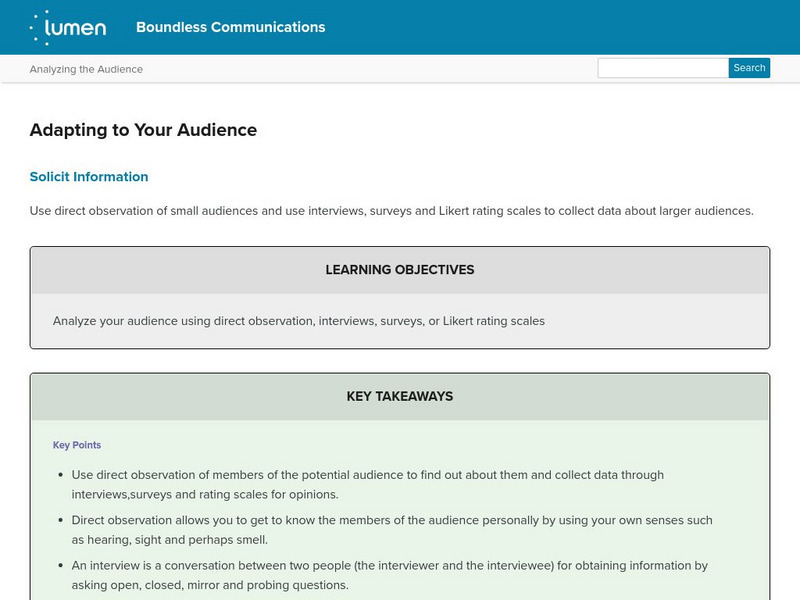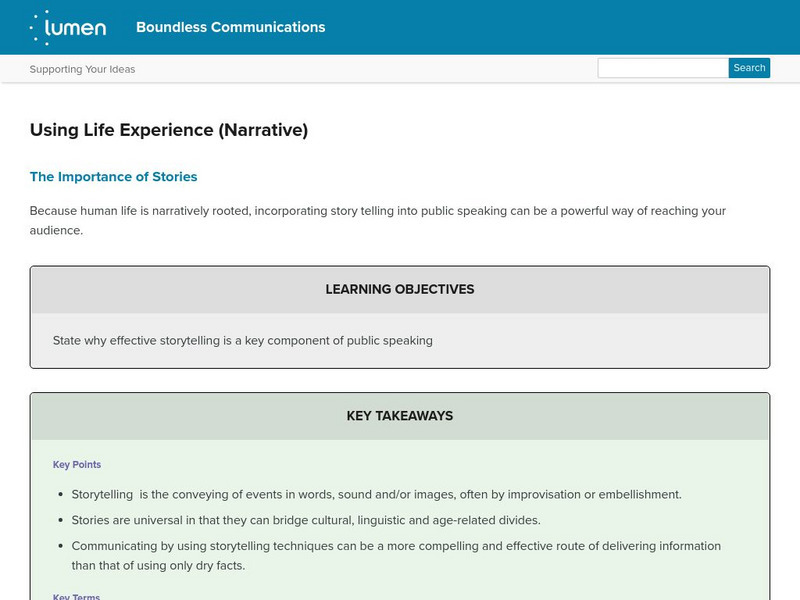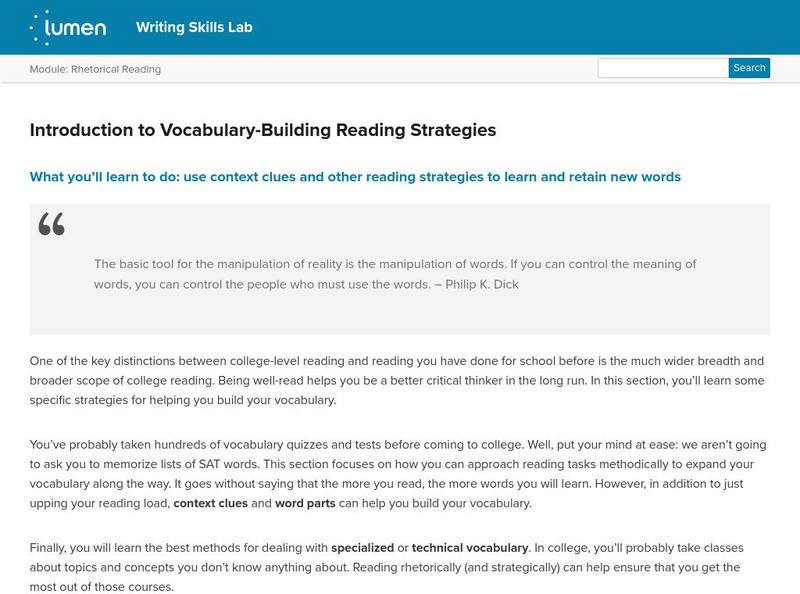Sophia Learning
Sophia: Determining Your Audience
On this website you will find information, two presentations, and a practice worksheet explaining how to decide the audience of a written piece and how to appeal to an intended or general audience in an original text....
Sophia Learning
Sophia: Real & Fictitious Settings
This lesson introduces real and fictitious settings in fiction writing. This tutorial lesson shares a short slideshow with the lesson's content.
Sophia Learning
Sophia: Appropriate Language
Students can learn how to use language appropriately through these notes on pretentious language, nine presentation slides on using jargon, eleven presentation slides on cliches in writing, and a video also about cliches. [2:00]
Colorado State University
Writing@csu Guide: Understanding Writing Situations
In this guide, you can learn more about the situations in which writers and readers find themselves and the physical, social, cultural, and historical contexts that shape them. Click on each of the links on the right to learn about the...
Other
Fiction Writing Tips: Creating a Vivid Setting
Some excellent guidelines to consider when evaluating your setting in a short story or novel. Discusses the importance of setting, some examples, as well as practical advice in setting your story. W.11-12.3d Sensory/precise lang narratives
Caro Clarke
Caro Clarke: Description: What's It For?
This is the twelfth article in a series that is designed to help the new novel writer. This article focuses on how to effectively use descriptions in any writing.
ReadWriteThink
Read Write Think: Making Connections to Myth and Folktale
Excellent online lesson based on N. Scott Momaday's The Way to Rainy Mountain. Students create a three-voice narrative based on the novel in studying and learning about myths and folktales. W.9-10.3a,3b,3d,3e Narratives, W.9-10.5 Writing...
Writing Fix
Writing Fix: Leads for a Most Embarrassing Moment Narrative
Inspired by the embarrassing situation Byron finds himself in during chapter 1 of Christopher Paul Curtis's The Watsons Go to Birmingham - 1963, learners will think of their own embarrassing moments they might write about. Using the...
Writing Fix
Writing Fix: Inventing a New Word
Inspired by the main character's actions in Frindle by Andrew Clements, students will be asked to reinvent an everyday object with a brand new word. They will need to imagine a character has reinvented their word, and then they will...
Caro Clarke
Describing Your Characters Through Their Actions
This is the tenth in a series of articles designed to help the new novel author. This article focuses on how to develop characters through their actions instead of simply relying on dialogue and description of thoughts. W.11-12.3d...
Sophia Learning
Sophia: Writing Narratives
Notes, a PowerPoint presentation, two videos, a song, an exercise, and a game help students to understand how to write a narrative. Elements of a narrative as well as the use of figurative language and sensory images are introduced and...
Sophia Learning
Sophia: Audience and Writing Style
This slideshow tutorial focuses on adjusting writing style to fit the audience. It looks at audience characteristics and discusses how to adapt the vocabulary, sentence style, and tone to fit them. It provides an example using the topic...
Other
Kim's Korner: Six Trait Analytic Writing Model
Check out this comprehensive website featuring ideas for teaching writing based on the six trait analytic writing model.
Other
Storytelling in the Classroom
There are several steps to becoming a storyteller. Find out what they are and be on your way to becoming a storyteller here! Learn how to find good stories to tell, and how to tell them to an audience effectively.
Texas Education Agency
Texas Gateway: Origins and Meanings of Foreign Words and Phrases
Become acquainted with the origins and meanings of foreign words and phrases frequently used in English texts.
Lumen Learning
Lumen: Boundless Communications: Adapting to Your Audience
This instructional activity focuses on adapting your speech to your audience including analyzing your audience using direct observation, interviews, surveys, or Likert rating scales and then apply knowledge about the audience to adjust...
Lumen Learning
Lumen: Boundless Communications: Elements of Speech Communication
This lesson discusses the elements of speech communication including the speaker, message, types of channels, audience, and feedback.
Lumen Learning
Lumen: Boundless Communications: Types of Sensory Enhancements
This lesson focuses on the types of sensory enhancements and how to effectively use them. SL.9-10.2 eval & integrate sources, SL.9-10.5 Audio Visuals
Lumen Learning
Lumen: Boundless Communications: Using Life Experience (Narrative)
This lesson focuses on using narratives or stories in speeches. It discusses the importance of stories, the power of storytelling, and how and when to use stories in speeches.
Lumen Learning
Lumen: Boundless Communications: Main Points
This lesson focuses on choosing the main points of your speech based on your audience and purpose. It also discusses ordering and highlighting your main points using visual and textual cues and using a variety of examples.
Lumen Learning
Lumen: Boundless Communications: Understanding Language
This lesson focuses on understanding the language, both verbal and non-verbal, of your speech. It discusses the importance of language, word choice, purpose and audience, ways of thinking about language, venue and occasion, and delivery.
Lumen Learning
Lumen: Boundless Communications: Using Language Effectively
This lesson plan focuses on using language effectively in your speech including using clear words and phrases, defining key terms, writing descriptively, using vivid language, considering your style and tone, and determining and...
Lumen Learning
Lumen: Critical Reading: Vocabulary
This lesson focuses on increasing your vocabulary including using context clues, dictionaries, and your working vocabulary. It also offers two videos with strategies for enhancing your vocabulary.
Lumen Learning
Lumen: Rhetorical Reading: Intro to Vocabulary Building Reading Strategies
This article explains in general how to build vocabulary using reading strategies such as context clues.



